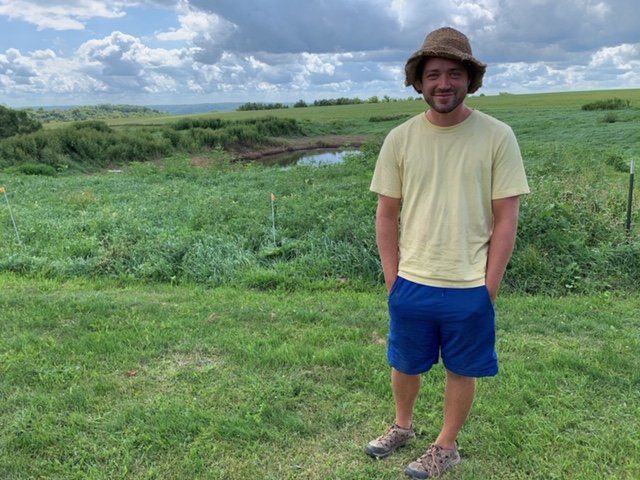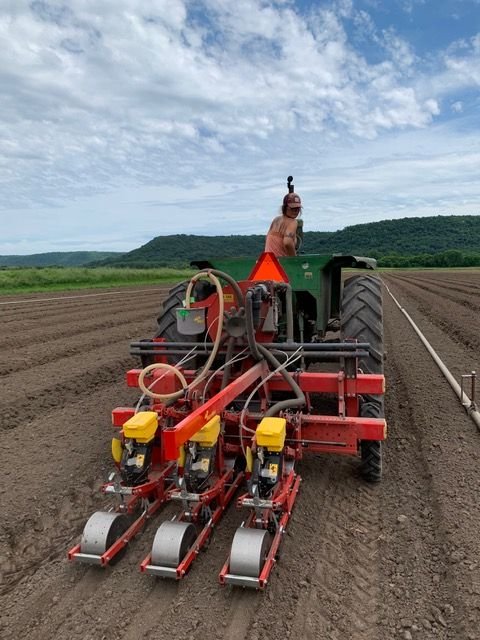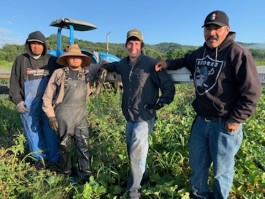I divided this summer roughly evenly between two jobs: the first, as a farmworker at Featherstone on a harvest crew that calls itself El Poder del Norte (The Power of the North); the second, as a rookie PhD student in the Sociology Department of Princeton University. I worked on El Poder del Norte (above photo is that crew, Jose Hugo, Juan Manuel, myself, and Mote) for eight months prior to entering graduate school last year. That job—which consists of long hours picking produce in rain and sun and cold—felt familiar. The job as a PhD student felt more foreign, and took time to settle into: ending work days in front of a laptop, typing notes; conducting formal interviews in Spanish and English; tape recording crew members as they talk about their lives. My goal and ongoing challenge in graduate school is to join these two worlds. I hope to expand my work at Featherstone into a larger project about migration from rural Mexico to rural Minnesota and the various social forces, identities, histories, and politics that shape it.
Yet, pulling together two worlds—one which leaves your hands dirty at the end of the day, which makes your back sore and reddens then darkens your skin, and the other, which does not—is difficult. I worked three days a week on the farm and three days a week writing, interviewing, transcribing, and studying US immigration policy. On those days, which I spent at home, crew members would sometimes provide sly, quick comments that reminded me that I straddled different worlds. It might come in the form of a playful text—“120 boxes of kale and you leave us!”—or a question—“Nice and cool in the apartment, right?”—or a joke: “You in there writing poems like Joaquín Sabina?” Convincing crew members that the research I was doing constituted “work” was an ongoing challenge.
The challenge runs in the opposite direction, too. When reviewing the academic literature on migration, I am consistently surprised by how often academics describe the work done by millions of Mexican migrants as “unskilled” or “low-skilled.” Academics rarely unpack what they mean by “skill,” instead presenting it as a binary concept: one privileged group possesses it, another disadvantaged group lacks it. The colloquial defense of migrants, that “migrants do the work that U.S. citizens do not want to do” is similarly problematic. It suggests that U.S. citizens from the onset can do that work, they just choose not to. Anthropologist Seth Holmes argues, convincingly, that the designation of “farmworker” alone—as distinct from “farmer”—implies a correspondingly lower skill level. He pushes back against it, writing “I recognized quickly that I was an unskilled laborer and that my Mexican companions were quite skilled, with precise techniques for picking quickly and sustaining this [harvest] pace,” but he is the only academic I have encountered who makes such a critique.
My working hypothesis is that academics are somewhat sloppy with the concept of skill because so few of them have ever worked in jobs that demand physical skill. In other words, academics come from a social context in which “skill” is unreflexively equated with education level, whether the education comes in a university or vocational school. To be skilled, one must pass through some recognized institution, to be externally validated—accredited—in some way. Skillsets that harvest, wash, and pack food do not earn similar recognition. Thus, academics and others can persist with the illusion that my coworkers on El Poder del Norte are unskilled. It would not bother me so much if I felt that doing so was without consequence. Yet, framing, especially in a political era as fragile as our own, is key. In this political era, the label “unskilled,” when used by otherwise progressive academics to describe working class migrants, adds insult to injury. Moreover, in the case of migrant farmworkers, the description of “unskilled” is empirically inaccurate.
In interviews with employees on the farm, a common response to the question, “How long have you worked in agriculture (en el campo)?” was simply “my whole life (toda mi vida).” Mote, the crew lead of El Poder del Norte, left school when he was ten to start working on planting and harvest crews around his rural village.

[above photo: Mote picking your broccoli this week]
He did field work in Mexico until he crossed the border in 1999 to work in Colorado for $5.70 an hour. For the past two decades, he has split his life between the U.S. and Mexico. He planted onions in dry Colorado soil until the skin peeled from his fingertips, worked on pick crews as big as 300 people outside of Sacramento, and the only non-agricultural jobs he has held were relatively brief stints in factories and landscaping. His level of agricultural experience is not atypical. Juan Manuel grew up tending goats and working in tomato and pepper greenhouses near his village.

[above photo: Juan Manuel on your broccoli harvest.]
When Juan Manuel was 19, he did piece rate bean harvest work in western Mexico, harvesting late into the night with a headlamp. Mote’s younger brother, José Hugo, left school when he was 16 to do agricultural work full-time.

[above photo: Jose Hugo on melon harvest]
Jose Hugo worked the night shift at a greenhouse near his village, spraying so harvesters could pick in the morning. The rumble of a backpack sprayer kept him awake at 2 AM. For them, agricultural work is something ingrained, an internalized set of knowledge and physical know-how that would look easy and effortless from afar. But it is neither easy nor effortless in practice. I have worked on farms for over three years and only now can I keep up with this crew, and even that slips at times when Mote sprints ahead on a kale harvest.
Sociologist Matthew Desmond employs the concept of habitus in his writing on wildland firefighters. This concept comes from French sociologist Pierre Bourdieu and directs attention to types of knowledge, dispositions, and behaviors that are embodied at a young age as a result of one’s social context. Desmond argues that wildland firefighters internalize a set of knowledge for working in large swaths of wilderness because they grew up as self-described “country boys.” This social context shapes the way they see wilderness, along with the various calculations they make and risks they take in their profession. Something similar is at play with my coworkers on the farm. Years of experience, originating in the agave and garbanzo fields of Guanajuato, Mexico and developing further in the pepper and melon fields of California, the blackberries and pine trees of Oregon, and among the valleys and ridges of southern Minnesota, underpin their everyday work. These years of experience constitute their expertise, a habitus derived from lifetimes of rural living and agricultural work. Their expertise is not accredited by any certificates or professional training; it is embodied.
I began working on farms because I loved agriculture: spider webs glowing in dew on the edge of fields; dark, loosened soil after tillage; the mix of human vision and earth. I grew up in the country. There, I feel at home. Long hours with crews of Mexican farmworkers inspired another interest, one in the narratives of migrants. I want to continue to learn more about how their lives intersect with US immigration policy, how joy, hurt, and hope play out across borders, and how rural identity changes and remains constant transnationally. As I prepare to leave a summer of work and research and return to academia—that other world—I am humbled by the generosity this crew has shown me. In addition, hours spent with them crouched in fields, our boots heavy with mud, making bunches of kale or heaving watermelons, affirms to me that the work they do is skilled and ought to be respected as such. Migrant farmworkers do not simply take jobs that native-born citizens do not want; they take jobs that most native citizens lack the expertise to perform effectively. They bring to these fields decades of experience and embodied knowledge, a habitus that few native-born citizens possess. For this, our country owes them a debt of gratitude. Recognizing them as skilled workers is a small but necessary step towards paying that debt.
Gratefully,
Shelby O'Neill
Harvest Crew




